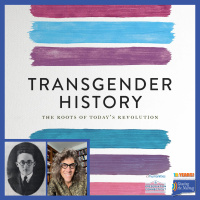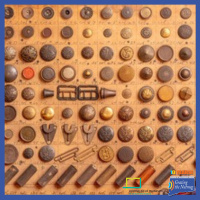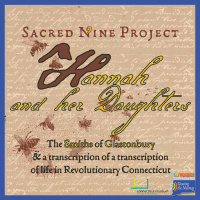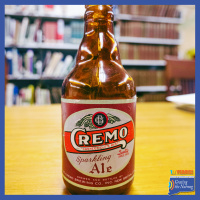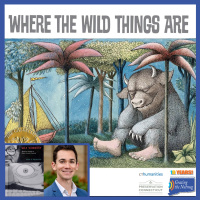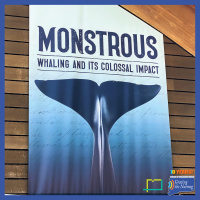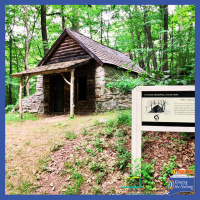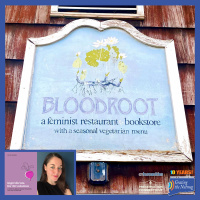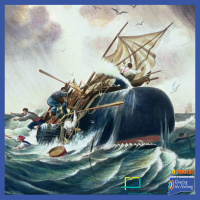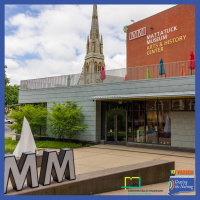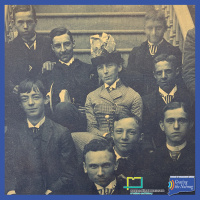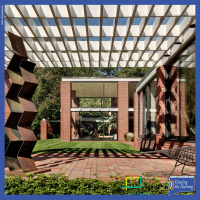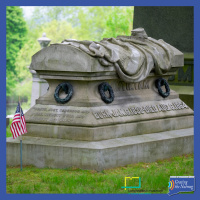Sinopsis
The podcast of Connecticut history. A joint production of the State Historian and Connecticut Explored.
Episodios
-
224. Scholar, Activist, Trailblazer: The Enduring Legacy of Dr. Lorenzo Greene
30/01/2026 Duración: 27minConnecticut is a small state that has had a huge national impact. In this episode, we celebrate someone that we are proud to say was born in Connecticut and went on to be a pioneering historian in Black history. Dr. Lorenzo Johnston Greene received his BA in from Howard University in 1924, his MA from Columbia University in 1926 and his Ph.D. in 1942. He was born in Ansonia, Connecticut. We can learn more about his family from the 1900 federal census record. His father Willie was born in 1858 in Virginia before the end of slavery, and his mother was born in West Virginia in 1870. Both came to Connecticut and by the time Lorenzo was born in 1899, he had five older brothers and sisters. The census states that both of his parents can read and write and their children are in school. By the time of the 1920 census, Lorenz has two older brothers who work in a brass mill. What made Lorenzo want to go to college and become a historian? When did he work with Dr. Carter Woodson, the "Father of Black History" and wh
-
223. The 'Great Temperance Times' in Nineteenth-Century Black Connecticut
14/01/2026 Duración: 41minAt first glance, alcohol and racial equality might seem unrelated—but for Black activists, the temperance movement was a powerful vehicle for social change. In this episode of Grating the Nutmeg, Natalie Belanger of the Connecticut Museum chats with Mackenzie Tor about her research into Black temperance activism in 1830s and 1840s Connecticut. Mackenzie talks about how people like Maria Stewart, James Pennington, and the Beman family used temperance as a strategy for civic inclusion. Through their words and organizing efforts, from newspaper columns to church halls, abstaining from the bottle became a radical tool for political belonging in the hands of Connecticut's Black communities. She also discusses the flip side of this – how accusations of intemperance could be wielded to bring down successful Black men, like New Haven's William Lanson, when their business and civic ventures threatened the power of white elites. Mackenzie, a PhD Candidate in History at the University of Missouri, did research fo
-
222. Cabbage Patch Kids and West Hartford's Toymaker Coleco
01/12/2025 Duración: 22minDuring this holiday season, it seems like the perfect time to bring you the story of one of the bestselling toys ever - Cabbage Patch Kids! Inducted into the Toy Hall of Fame in 2023, Cabbage Patch Kids set every toy industry sales record for three years running from 1983-86, and has become one of the longest-running doll franchises in the United States. How did a Connecticut company produce the hottest toy of the 1980s - and then go broke? The license to produce Cabbage Patch Kids has gone through a record 7 toy companies. This episode is on the Coleco years - the toymaker with their headquarters in West Hartford. Host Mary Donohue will share her experience buying the dolls and Natalie Belanger, Grating the Nutmeg producer from the Connecticut Museum of Culture & History, her own childhood experience playing with the Cabbage Patch Kids. It's hard to believe after such a successful toy, but Coleco Industries were bankrupt by 1989. The Hartford Courant published numerous full-page stories about what ha
-
221. New Haven's Lt. Augusto Rodríguez, First Civil War Soldier from Puerto Rico
14/11/2025 Duración: 25minMore than twenty thousand Hispanic Americans served in the Civil War. When Cuban-born Loreta Velázquez's husband would not allow her to join him on the battlefield, she assumed the role of First Lieutenant Harry T. Buford to be near him. Philip Bazaar, born in Chile, was awarded the Medal of Honor for his courageous exploits during the assault of Fort Fisher. The spying efforts of Floridian Maria Dolores Sánchez and her two sisters led to a Union defeat at the Battle of Horse Landing. Delving into the lives of these individuals, historian A.J. Schenkman, author of Hispanic Americans of the Civil War, published by the History Press in 2025, uncovers this often-overlooked aspect of Civil War history. Hispanic soldiers came from different countries. Mexico had declared its independence from Spain in 1821 and later abolished slavery in 1837. Some soldiers and sailors traced their families to Cuba and Puerto Rico, which were still part of Spain. Or from Spain itself or its other colonies. In this episode,
-
220. Connecticut Yankee Atomic Power Plant: The Promise and Peril of Nuclear Energy
31/10/2025 Duración: 29minThe Connecticut Yankee atomic power plant was one of the earliest commercial nuclear reactors in New England. Though it was dismantled at the turn of the 21st century, its legacy remains, both for the landscape of the Connecticut River Valley where it once stood, and for contemporary debates about energy today. This episode explores the plant's life and afterlife, the activists who opposed it, and the promises and perils of nuclear power in the 1960s and today, through the reminiscences of Paul Gionfriddo, a former state legislator and longtime president of People's Action for Clean Energy, a group that has advocated for conservation and renewable energy in Connecticut since the early 1970s. This episode is presented by Dr. Amrys Williams and Jon Kozak. Williams is a historian of science, technology,and the environment who serves as the Executive Director of the Connecticut League of Museums. Her recent research projects have focused on anti-nuclear activism, radioecology, and the public interpretation
-
219. Transgender History and Connecticut Transgender Pioneer Dr. Alan L. Hart
15/10/2025 Duración: 55minThe transgender community has struggled to receive recognition and equality. In this episode, we explore the history of the transgender community over the last 100 years with Dr. Susan Stryker and the life of Dr. Alan L. Hart, a transgender medical doctor working on the forefront of an urgent public health crisis, tuberculosis, in Connecticut. Hart, Director of Connecticut’s Office of TB Rehabilitation, is credited with saving countless lives. My guest is Dr. Susan Stryker, author of Transgender History, the Root of Today’s Revolution, published in 2017. Transgender History, Third Edition: A Resource for Today’s Struggle-and Tomorrow’s will be published in Febuary, 2026. Dr. Susan Stryker holds a distinguished visiting appointment at Stanford's Michelle R. Clayman Institute for Gender Research at Stanford University, and is Professor Emerita of Gender, Women's and Sexuality Studies at the University of Arizona, where she directed the Institute for LGBT Studies for many years. She is the author or editor o
-
218. Connecticut in the Industrial Revolution: Making Buttons in Cheshire
01/10/2025 Duración: 42minA button sounds like a very ordinary thing. But button production in Cheshire was part of Connecticut’s pioneering role in the precision manufacturing revolution of the nineteenth century. According to connecticuthistory.org, button production began with pewter buttons in the mid-eighteenth century but quickly turned to brass in the early nineteenth century. By 1860s, machines in the Scovill Brass factory in Waterbury produced 216,000 buttons per day. This type of industrial production volume for an everyday necessity such as buttons propelled investors and entrepreneurs to establish companies such as the Ball & Socket Manufacturing Company. But what were the benefits and costs of Cheshire’s industrial development during Connecticut’s Industrial Revolution? Cheshire’s Ball & Socket factory has been transformed into a community arts center as we discovered in Grating the Nutmeg episode 167. New Lives for Old Factories. But its industrial past has not been forgotten-new research by noted historian
-
217. The Smith Family of Glastonbury: Hannah and Her Daughters
14/09/2025 Duración: 33minIn this episode of Grating the Nutmeg, Natalie Belanger tells us about how two journals kept by a Revolutionary War-era girl in the Connecticut Museum of Culture and History’s collection have inspired an original work of music. Several years ago, Leonard Raybon (Associate Professor of Music at Tulane University) encountered two journals and other writings by Hannah Hadassah Hickok, held at the Connecticut Museum. Hannah was the matriarch of the non-conformist Smith Family of Glastonbury. Her daughters would go on to became nationally famous for protesting their lack of voting rights in the 1870s by refusing to pay their taxes — an act that resulted in the town of Glastonbury confiscating their property, including their beloved cows. Inspired by the young Hannah's unique voice, Leonard composed an original mini-musical based on her writings. You'll hear Natalie and Leonard's conversation about what moved him to compose the piece and how it fits into his larger project of producing "Ameri-musicals" tha
-
216. Brewing Community: Labor, Alcohol, and Unrest in Industrial New Britain
01/09/2025 Duración: 28minImmigrants from Lithuania who made their way to New Britain, Connecticut at the beginning of the twentieth century found work in the city’s factories turning out tools and hardware. Their weekly routine included work, church and socializing at neighborhood saloons. But major upheavals in American society were happening at the time that affected their lives including the rise of organized labor, the temperance movement, anti-immigrant sentiment, and labor strikes. In this episode, we have two new voices in public history, Central Connecticut State University students Jon Kozak and Nathaniel Smith. They produced the episode as a class project under Dr. Leah Glazier at Central Connecticut State University. This episode reminds us that some of the most interesting history can be found all around you in your own community. A big thanks to Jon Kosak and Nathaniel Smith for their hard work in producing this episode. I also want to thank Dr. Glazier, professor of public history for her help. Contact Jon Kosak
-
215. Connecticut’s Wild Visionary: Children’s Author Maurice Sendak
15/08/2025 Duración: 52minArtist and author Maurice Sendak was able to achieve significant and enduring success in art and children’s literature during his lifetime. But what secrets did he had to keep from his family, publishers, parents, librarians, and readers as a gay, Jewish man negotiating the field of children’s literature? Sendak wrote and illustrated books that nurtured children and adults alike. Winner of the 1964 Caldecott Medal for Where the Wild Things Are, in 1970 Sendak became the first American illustrator to receive the international Hans Christian Anderson Award, given in recognition of his entire body of work. Sendak’s work has been the subject of several extensive retrospective art shows at prestigious museums across the country. Sendak lived in Ridgefield, Connecticut with his partner Dr. Eugene Glynn for over 50 years. In this episode, my guest is Dr. Golan Moskowitz, author of Wild Visionary, Maurice Sendak in Queer Jewish Context, published by Stanford University Press in 2021. Dr. Moskowitz is an Assist
-
214. Monstrous: The Business of Whaling
01/08/2025 Duración: 41minWhaling was big business. Connecticut and her sister New England states built ships, forged cast iron tools, produced wooden storage casks and outfitted sailors. Stonington, Mystic, New London, and New Haven were part of New England’s predominance in successful whaling. We’re going to get into the nitty gritty of the trade in this episode and hear about some of the striking artifacts from Mystic Seaport’s whaling collection - tools, ship logs, harpoons, blubber hooks and scrimshaw - that are on view. They speak to the staggering risks and rewards of the whaling industry that lit America’s lamps and greased its machines for over a century. We’re also going to talk about the largest whaling artifact of all - the Charles W. Morgan, the last American whaling ship in existence. It was considered “ancient” in the 1920s but has been faithfully restored. This summer we are featuring two episodes on whaling. To get the big picture on whaling, we talked to one of our favorite guests, Eric Jay Dolin, in episode 211
-
213. When the Continental Army Camped in Connecticut
15/07/2025 Duración: 34minThe Redding Encampment, Connecticut’s first State Archaeological Preserve, is located in Putnam Memorial State Park. Understanding of the Revolutionary War has emphasized the battles, maneuvers, and war meetings; but far more time was expended during the long periods of winter encampment. The winter months were a brutal test of individual fortitude, unifying command, and local support. In the journal Joseph Plumb Martin kept at the time, he wrote, “We arrived at Redding about Christmas or a little before and prepared to build huts for our winter quarters. And now came on the time again between grass and hay, that is, the winter campaign of starving.” Compared to Valley Forge or Morristown, the archaeological evidence supports the poor conditions described by Martin. The site remains intact and is a relatively unknown archaeological gem, administered by Connecticut Department of Energy and Environmental Protection. Our publisher Dr. Kathy Hermes chats with Ellery Leary, the official park historian of Putnam
-
212. Ingredients for Revolution: Feminist Restaurants featuring Bloodroot Restaurant
01/07/2025 Duración: 42minConnecticut Explored and our podcast, Grating the Nutmeg, have featured many of the heritage trails that mark the important histories and sites of Connecticut’s people. Preservation Connecticut has undertaken a survey of LGBTQ+ heritage sites across the state. Now, Grating the Nutmeg and Preservation Connecticut have teamed up to bring you a three-episode podcast series that pairs new research on LGBTQ+ identity and activism with accounts of the Connecticut places where history was made. The episodes include a thriving vegetarian cafe-bookstore run by lesbian feminists in a working-class former factory town, a transgender medical researcher working on an urgent public health issue in the center of Connecticut politics, and a gay, Jewish, best-selling children’s book author in affluent Fairfield County. In this episode, Dr. Alex Ketchum, author of Ingredients for Revolution: A History of American Feminist Restaurants, Cafes, and Coffeehouses, published by Concordia University Press in 2022, reveals the hi
-
211. Leviathan: New Englanders and the History of Whaling
15/06/2025 Duración: 50minAmerican whale oil lit the world. The Industrial Revolution couldn’t have happened without it. Connecticut was part of the whaling industry of the nineteenth century that sent thousands of American ships manned by tens of thousands of men to hunt whales across the world’s oceans. Stonington, Mystic, New London, and New Haven were part of New England’s predominance in successful whaling. In fact, New London, Connecticut is known today as the “Whaling City”. My guest Eric Jay Dolan is the author of sixteen award-winning books on maritime history. In this episode, we will be talking about the history of American whaling taken from his work in Leviathan The History of Whaling in America published in 2007 byW.W. Norton Press. His latest book, is Left for Dead: Shipwreck, Treachery, and Survival at the Edge of the World. Dolin lives in Marblehead, Massachusetts. Note: Listeners may find this episode disturbing. Whaling was a brutal trade - we are describing the industry in its historic context. To fin
-
210. The Mattatuck Museum: Waterbury and Summer Leisure
01/06/2025 Duración: 39minIn this episode, host Mary Donohue visits the Mattatuck Museum in Waterbury, a place that includes stellar architecture, art by some of the most renowned artists of the nineteenth and twentieth centuries, and an exhibition that tells the story of Waterbury’s rise as a manufacturing powerhouse. The Mattatuck Museum is an art and regional history museum on the Green in downtown Waterbury, that started out as a historical society in 1877. Our guest is Rebecca Lo Presti, Assistant Curator. She served as the curator for “ The Art of Leisure” an exhibit that is up now until June 15, 2025. From pencil sketches of working-class families picnicking to paintings done by Americans on the European Grand Tour, the exhibit shows how artists depicted recreation, relaxation, and travel in their work. They also talk about what else you’ll see at museum when you visit including the artwork of American masters associated with Connecticut such as Anni Albers, Alexander Calder and Frederic Church. And, on the quirkier side,
-
209. Mary Hall and the Good Will Club
15/05/2025 Duración: 20minIn this episode, Natalie Belanger of the CT Museum of Culture and History tells the story of the Good Will Club, the forerunner of the youth club movement that got its start in Hartford. But the story of the club can't be separated from that of its founder, a woman who's an inductee of the CT Women's Hall of Fame for her barrier-breaking work in the legal field. There are lots of ways to learn more about the history of the Good Will Club and about Mary Hall. Here’s a partial list of sources consulted for this episode: Elizabeth Warren, “Mary Hall: Breaking the Legal Barrier,” CT Explored, Spring 2010 Kevin Flood, “The Boys and Girls Clubs of America Started Here,” CT Explored, Fall 2019 Mary Hall’s Entry in the CT Women’s Hall of Fame Judge A. Susan Peck, “Upcoming Survey on the Status of Connecticut Women in the Legal Profession,” CT Lawyer, September/October 2024 Some other sources you might like to check out: You can look at digitized issues of the Good Will Star, the newspaper published by
-
208. Saving Connecticut’s Mid-Century Modern Homes
01/05/2025 Duración: 40minWe’re celebrating May, Historic Preservation Month, with an episode on the Modern houses of the 1950s and 1960s. Could you live in a glass house? New Canaan, Connecticut’s Mid-Century Modern homes designed after the Second War are world famous. In addition to Philip Johnson’s Glass House, now a museum, New Canaan has homes designed by Marcel Breuer, Eliot Noyes, Frank Lloyd Wright and Edward Durell Stone. Each one is a part of architectural history and is a masterwork of the era’s most talented architects. But by the 1990s, people began to demolish these relatively small homes sited on large lots. People in New Canaan began to band together to save these artworks-”machines for living”. Towns across Connecticut have at least one or two good Mid-Century Modern homes worth saving and celebrating. Host Mary Donohue discusses what a homeowners and community members can do to help save these modern homes. Her guests are Gwen North Reiss, historian and author of New Canaan Modern: A Preservation History p
-
207. Book and Dagger: Yale Professors Become Successful WWII Spies
15/04/2025 Duración: 40minIn her new book, Book and Dagger, How Scholars and Librarians Became the Unlikely Spies of the World, Dr. Elyse Graham tells the story of academics, like Yale literature professor Joseph Curtis, who hunted down German spies and turned them into double agents, and Sherman Kent, a Yale history professor who rose to become the head of analysis for all of Europe and Africa. At the start of World War II, the United States found itself in desperate need of an intelligence agency. The Office of Strategic Services (OSS), a precursor to today’s CIA, was quickly formed—and in an effort to fill its ranks with experts, the OSS turned to academia for recruits. Suddenly, literature professors, librarians, and historians were training to perform undercover operations and investigative work-and these surprising spies would go on to profoundly shape both the course of the war and the future CIA with their efforts. This episode’s guest is Dr. Elyse Graham, professor in the English Department at Stony Brook University an
-
206. Hartford’s Rural Cemetery: Cedar Hill
01/04/2025 Duración: 30minLast year in episode 186, we talked about Grove Street Cemetery’s pioneering role as the first planned cemetery in the country. The design of Grove Street Cemetery in New Haven in the 1790s used several of the features that became standard, like family plots and established walkways. Today, we’re going to move the clock forward and discuss the rural cemetery movement of the 19th century with Cedar Hill Cemetery in Hartford as a signature example. Established in 1864, Cedar Hill Cemetery encompasses 270 acres of landscaped woodlands, waterways, and memorial grounds. The urban oasis serves as a sanctuary for Connecticut history, impressive funerary art, and natural beauty. In this episode, Host Mary Donohue interviews Beverly Lucas, Director of the Cedar Hill Cemetery Foundation. The Foundation is the non-profit that raises money for the restoration of the monuments and also hosts many events and guided tours. Be sure to follow the Cedar Hill Cemetery Foundation on Facebook and Instagram to find out abo
-
205. Coffee — A Connecticut Story
15/03/2025 Duración: 34minCoffee is more than a hot drink or a boost of caffeine. For Connecticans, it’s hundreds of years of history. It has fueled new ideas, social reform, and workers’ rights. It is comfort in wartime and connections across cultures. It is universal, yet distinctly local. In this episode, the Connecticut Museum of Culture and History's Natalie Belanger chats with her colleague, Karen Li Miller, about the Museum's new exhibition exploring these connections, Coffee — A Connecticut Story. Make sure to visit the Museum's web site to see upcoming programs! https://www.connecticutmuseum.org/exhibition/coffee-exhibition/ Thanks to the Connecticut Museum of Culture & History for their financial sponsorship of Grating the Nutmeg, helping us bring you a new episode every two weeks. ----------------------------------------------- We count on our sponsors, advertisers and most importantly our listeners for their support. Help us continue to tell the important stories from Connecticut’s history by donating a fixed dol





